In Thailand a web of cultural, historical and economic factors has served to make the sex industry a booming sector of capitalist growth. For centuries, brothels, and the practice of concubinage have existed in Thailand, but over the past few decades the sex industry has expanded rapidly and has become an integral part of the Thai economy and society.
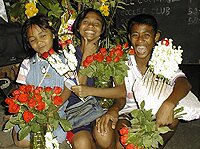 Cultural Factors Cultural Factors
Although lax government policies and regulation of the sex industry are important factors, the roots of Thai societys social acceptance of prostitution go further back into history. The principal strain of Thai Buddhism( Theravada Buddhism) is a hybrid of the original Indian Buddhism and has been a powerfull force in Thailand for over 700 Jears. Buddhist values and beliefs continue to influence the attitudes and values of most Thais, as over 90 per cent Thailands population is Buddhist. The traditional emphasis on polygamy in Theravade Buddhist society is said to have fostered the widespread practice of commercial sex work in Thailand today. Polygamy was outlawed 1n 1935 but ist still practised today - formally through men having more than one wife and informally through visting CSWs ( Commercial Sex Workers). Thailands current economic development model has also served to institutionalize sex as a commodity and womens bodies as easily obtainable objects of consumption. The sex industry can, in fact, be viewed as an variant of polygamy, as both ptovide men access to the sexual services of more than one woman.
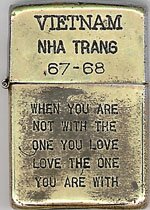 The Vietnam War (The American War) The Vietnam War (The American War)
The enorous scale of Thailands sex industry today is largely a result of the American War in Vietnam. In the 1960s US Military bases began to proliferate in Thailand, and many young women were induced into the sex industry by their families and profiteers, as the high demand of US servicemen coalesced with the needs of Thailands impverished villages - eventualy leading to the acceptance of prostitution as a source of income for young women. By the time the war ended in 1976, sex-industry establishments had expanded across the county and tourism was promoted in order to gain foreign exchange. thailand was advertised to male foreign tourists as a place where they could indulge in sexual services, while at the same time it remained coomon for Thai men to visit brothels. Thus commercial sex became a huge business in Thailand, and quickly evolved into a well- organized industry supported by poerfull entities.
Dynamix of the sex industry today The majority of CSWs in Thailand come from poor, rural families from the countrys north and northeast, and more and more come from Burma and China. In the north, over 30 per cent of the rural population is landless, and another 20 % of farming families own less than one rai ( two fifth of one acre) - an insufficent amount to meet the needs. Women working as day-labourers on the larger rxport crop-producing farms are paid an average of USD 1.40 a day. Similary, in factories and working for golf courses - a new and booming business rthat primarily serves japanese businessmen - they can earn between USD 0.8o and USD 2.00 a day. Due to this substand wages, female caddies often sell their sexual services after a round of golf and many factory workers engage in sex work after hours. CSWs can earn between USD 400 to USD 800 a month - and the more attrative ones in Bangkok can often average more than USD 20.000 annually. Tourism has had a particulary influence on making the sex industry a common economic option for poor women in Thailand. Even though foreign men are a small portion of the sex industrys total clientele, they generally pay more for commercial sex services. Thus sex torists help fuel the fire by making sex work more profitable and glamorius. The Thai government has promoted tourism to become a major income-earning industry for the country. In 1987 tourism became the countrys primary source of foreign exchange - surpassing rice and textiles. Services within the tourism industry include restaurants, nightclubs, food and beverage stalls, hotels, and entertainment - all places where sex is sold. Thailands Department of Communicable Disease Control and Ministry of Public Health have clssified Thailnds sex service establisments into 19 categories including brothels, hotel/motels, tea rooms, nightclubes, beer bars, dancing bars, restaurants, coffee shop, cocktail lounges, pubs, massage parlours, beauty salons, barber shops and others.
 Recruitment and human rights violations Recruitment and human rights violations
Despite Thailands booming economy, in the 1980s and early 1990s many people in its poorest villages were becoming even poorer, as the wealth generated from Tgailands economic growth failed to provide sufficent economic opportunities for the poulation. At the same time, Thailands capitalist growth has given birth to a cult of consumerism that has raised impossible expectations amoung the population. This fatal combination has contributed to the heat expansion of the sex industry.
Girls and young women enter the sex industry largely to escape poverty, for themselves and also for their families, and to gain upward socio-economic mobility. Some migrate to Bangkok or other urban centres by themselves, but more often they are recruited. Girls as young as 11 and 12 are found working as CSWs all over Thailand. Much of the recruitment into the sex industry is village based. Men from the village - fathers, uncles, brothers - act as pimps for brothel owners. Middlemen give a flat sum, averaging about 5.000 baht ( about USD 200) to a relative of the young woman, who is often unaware of the nature or condition of her employment. The money than becomes credit against future earnings that she must work off - with interest. Tis practice is justified by many parents, as they feel that a job negotiated by a member of the family or community for their daughter would not be harmfull.
Howerver, many of these girls discover that the brothel owners use a combination of debt bondage, threats, force, and physical confinement to controŻ them, forcing thwm to work in deplorable, abusive conditions, eliminating any posibility of negtiation or escape. The debt, often compounded with 100 percent interest, is the cornerstone of comtrol exercises by the brothel owners and procurers.
The recruitment zone includes Thailands borders and extends into Burma, Laos, Cambodia, China, and even post-Soviet Russia. One estimate claims that over 10.000 Russian women are working as CSWs in Thailand. This phenomenon of girls and younger women entering Thailnds sex industry from the rural outskirts and abroad is stimulated by a high demand for "newer" CSWs who are believed to be free of HIV. 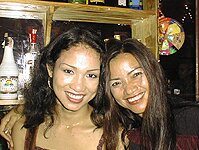
Many of the minority ethnic groups living in Thailands northeastern hills are engaged in opium poppy production, linked to the international trafficking of heroin, and many of their members are themselves often opium addicts. It is so common for hilltribe parents to sell their daughters into the sex trade in order to get cash to maintain their opium habit. Some parents knowingly sell them into the sex industry, others are told the girls will be working in restaurants and are promised no harm will come to them. Many girls come illegally over the border with a relative, or, as is more common, in a group organized by recruiters. The are impoverished, poorly educated, often landless, and do not posses birth documents. They are an extremely vulnerable group, so they are easy prey for recruiters to lure or force into prostitution. In the past few years increasing numbers of hilltrribe girls - Tai Yai girls from the Shan state in Burma are the largest group - have been found in brothel raids. and STD ( Sexual Transmitted Disease) clinics from the very north to the far south. It is sometimes difficult to detect hilltribe girls, as racketeers make phony passports and Thai citizenship dokuments for their foreign recruits.
The practices of forced prostitution, child prostitution, and debt bondage are flagrant violations of human rights. The lives of the girls and women who are forced into and held in prostitution have been taken away, as, accordng to Ron OGrady, the effects of their nightmarish experiences are so traumatic they can never be completely rehabilitated.
 Exporting sex Exporting sex
Thai CSWs constitute a not insignificant portion of the foreign workforce in countries like Germany, the United States, and Japan. Sa of 1988, approximately 8000 Thai CSWs were based in germany alone. According to Japans National police Agency, between April 1995 and March 1996 nearly 60% of CSWs in Japan were from Thailand. the remaining women were from South Korea, Taiwan, and the Philippines. Some women move abroad on their own, some go through agents, and others either apply or are induced into business-arranged foreign "marriages". Travel agencies, in cooperation with Thai tourist and business counterparts, often buy women in "marriage" to put to work as CSWs in the country to where they move. Those who do not re-enter the sex industry are still subject to labour exploitation - either through providing services that satisfacrily fulfil the phantasies that guided their new "husband"eastwaed or by entering the labour force in low-skill, low-wage employment.
 Thai womens burden Thai womens burden
In contarst to many societies, women in Thailand have played a central role as income-earners for their families and as financial supporters of their elders. In terms of social lberties, males in Thailand occupy a much more advantageous position than females. Young men are often given few responsabilities and allowed consicerable personal and social freedoms. In contrast young women must follow strict behavioural guidelines and must assume most of the family and househild responsibilities, while sacrificing their own freedom. Compounded by rural poverty and a lack of educational economic oppotunities, such heavy filial burdens push a large number of young women into the sex industry to earn income for their families. Performing their expected duties, young women from Thailands poverty-stricken north and northeast often go willingly with employment agents to work in Bangkoks massage parlours and other sex industry establishments. Commercial sex as a means for income has become a standart for many rural communities in Thailand. It hhas been estimated that there are approximatly two million CSWs within the country. Over all estimates conclude that one in every five Thai momen aged between 13 to 29 is a sex worker.
Although there is a clesr predominance of single males in the over five million tourists who visit Thailand each year, the vast majority of the clientele in the sex industry are Thai men. The frequenting of CSWs has become an institutionalized, socially acceptable practice for a very substancial part of the male population in Thailand.Approximately 70 to 80 % of all Thai males have visited CSWs and about 30 to 40% use their service regulary. And in certain areas of Thailand it is estimated that approximately 90 % of Thai men are regular clients.
Avisit to a brothel has become a rite of passage for adolescent single males, and in the age of 16, half of all Thai boys have visited a CSW.
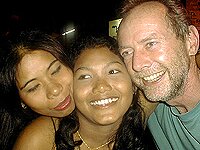 By 1989 the frequenting of CSWs by Thai males had become the driving force for AIDS in Thailand. However, due to the AIDS programmes promotion of condom use and public education targeting sex workers, condom use has been high for the last few years in sex establishments. However, in low-cost brothels, use remains inconsistent. By 1989 the frequenting of CSWs by Thai males had become the driving force for AIDS in Thailand. However, due to the AIDS programmes promotion of condom use and public education targeting sex workers, condom use has been high for the last few years in sex establishments. However, in low-cost brothels, use remains inconsistent.
Because of Thai womens submissive role in society, and due to the fact that CSWs are young girls, sexual subordination of both wife and sex worker is coomonplace and continues to fuel the spread of th virus.
Many AIDS experts say that the new problem in Thailand is premarital and extramarital promiscuity. Women and girlfriends do not ask their boyfriends or husbands to use condoms.
Thai society has in fact helped to foster the belief that men have the right to seek sexual gratification freely ouside marriage, based on the myth that sexual urges of men are more compelling than those of women.
Legislation : aggravating the problem?
Commercial sex is officially illegal in Thailand, but because powerful vested interests are at stake. there has been a tremendous lack of will to crack down the sex industry. acccording to Prof. Pasuk Phongphaichit of Chulalongkorn University, the money generated from the sex trade is higher than the value of narcotics smuggled out of the country. A team of researchers has estimated that the sex industry brings approximately 450 billion baht annually, or about half of the fiscal budget for 1995.
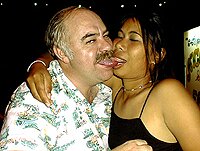 The illegal status of sex workers in Thailand renders them particulary helpless and vulnerable to exploitation, for they have no recourse to any protection from law or society. Many activists argue that sex workers need to be protected under the labour law to provide them with recourse in the case of abuse, to ensure they recieve at least a minimum wge and are guaranteed fair working hours. In practical terms, legalizing and regulating commercial sex work in Thailand would improve working conditions and the health and safety of CSWs. They would be able to organize more easily and could negotiate more safely with clients - knowing that the police would protect them as citizens rather than harrass them as criminals. The illegal status of sex workers in Thailand renders them particulary helpless and vulnerable to exploitation, for they have no recourse to any protection from law or society. Many activists argue that sex workers need to be protected under the labour law to provide them with recourse in the case of abuse, to ensure they recieve at least a minimum wge and are guaranteed fair working hours. In practical terms, legalizing and regulating commercial sex work in Thailand would improve working conditions and the health and safety of CSWs. They would be able to organize more easily and could negotiate more safely with clients - knowing that the police would protect them as citizens rather than harrass them as criminals.
In a society and economy where prostitution has already become common and is the highest paid source of income for unskilled womem, any attempt to suppress the industry without providing sound economic alternetives can only hurt them. The need to abolish child prostitution, forced prostitution, and trafficking is unquestionable, but hollow legislation fails to protect consensual CSWs from exploitation and puts them and the wives and children of their clientele at risk of HIV infection.
|